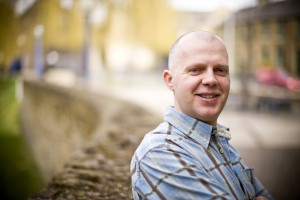Community reporting of violent extremism
Pictured above (l-r): Professor Paul Thomas, Professor Michele Grossman, Kris Christmann and Dr Shamim Miah
The first people to suspect or know about someone becoming involved in planning acts of terrorism, including involvement in overseas conflicts, will often be those closest to them.
While these friends, family and community insiders offer a first line of defence, very little is known about what it means to them to report the potential involvement of an “intimate” in violent extremism. This means that ‘intimates’ reporting is currently a critical blind spot in international attempts to counter violent extremism.
Community reporting thresholds

Paul Thomas, who is Professor of Youth and Policy at the University of Huddersfield, has researched a wide range of community issues, including the Prevent programme that is designed to halt extremism. Now, he and Visiting Professor Michele Grossman (Deakin University , Melbourne, Australia) have together headed a major new research project titled Community Reporting Thresholds. The research was funded by the Centre for Research and Evidence on Security Threats (CREST) and intended to develop an earlier Australian study by Professor Grossman.

The research team, which also included University of Huddersfield researchers Dr Shamim Miah and Kris Christmann, carried out a national series of in-depth interviews where interviewees from communities were taken through a series of scenarios based on real-life cases. They were asked what their feelings would be, what dilemmas they would face and what course of action they would take if they had information about a relative or friend involved in terrorism. The researchers also interviewed professional practitioners, including counter-terrorism police officers, Prevent coordinators based in local authorities and key workers from Muslim community organisations.
Community response

One key conclusion arising from the research is that reporting to the police is such a grave step that most community respondents would only do so after a staged process. First, they would attempt to dissuade their ‘intimate’, and also take counsel and guidance from family members, friends and trusted community leaders. Some younger respondents would also share concerns with lecturers or teachers. If those concerns needed escalating, the research showed that people want to report to the local police, not counter-terrorism specialists. They also wish to do so in person, so that they could assess how seriously their report was being taken and to enable discussion. This suggests that training all police personnel to respond appropriately would be beneficial to effective reporting. Telephone hotlines were not seen as appropriate for non-emergency concerns.
Supporting those who come forward
The project report makes a sequence of recommendations, such as the localisation and personalising of the reporting process and the development of support mechanisms for people who make reports. “It is important there is a response that’s more about welfare, safeguarding and counselling for both the person and the people doing the reporting,” Professor Paul Thomas. Officials from national and local government and policing organisations attended the research findings launch events and the team is now in discussions about how the findings can support improved policy and practice.
Following the launch of the UK project findings, the international dimension of the work expanded further when Professors Thomas and Grossman visited Ottawa at the invitation of the Canadian government to hold talks with officials, senior police officers and academics to discuss carrying out a similar research project in Canada. Colleagues in the USA are also taking a key interest in the findings, in recognition of the international importance of this topic.

Spotlight
Professor Paul Thomas and Dr Shamim Miah
Professor Paul Thomas and Dr Shamim Miah are both part of the Huddersfield Centre for Research in Education and Society (HudCRES), where Professor Grossman has recently been appointed a Visiting Professor. Kris Christmann is a member of the School of Health and Human Science’s Applied Criminology Centre. To find out more about the research in this article, please contact Professor Paul Thomas: d.p.thomas@hud.ac.uk
Autumn 2017 Issue
Return to the home page for the Autumn 2017 Issue of Discover.
Next article
Tackling global security challenges. Launched in March 2016, the Secure Societies Institute (SSI) represents a truly inter-disciplinary....